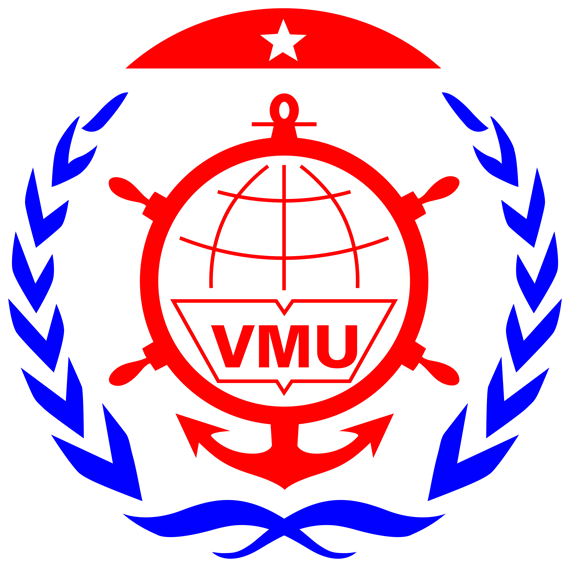1. Introduction
|
Program title: |
Bachelor of Logistics and Supply Chain Management |
|
Graduation degree: |
Bachelor's degree |
|
Study model: |
Full-time |
|
Total credits: |
130 |
|
Used language: |
Vietnamese |
|
Training duration: |
4 years (8 semesters)/ 4.5 years (9 semesters) |
|
Responsible Faculty: |
Faculty of Economics |
|
Website: |
|
|
Address: |
Room 112, 1st Floor, Building A4, Vietnam Maritime University, 484 Lach Tray - Le Chan - Hai Phong |
The Bachelor's program in Logistics and Supply Chain Management at Vietnam Maritime University (VMU) is developed by the Faculty of Economics, integrating both theoretical knowledge and industry best practices to enhance the management and efficiency of logistics and supply chain operations. The curriculum is continually updated to meet the evolving needs of the industry while adhering to the standards set by the Ministry of Education & Training and the university. Students will gain comprehensive knowledge, technical expertise, and professional skills, aligned with the Vietnamese National Qualifications Framework and international industry standards. Upon graduation, students will be proficient in designing, implementing, and managing logistics and supply chain processes. They will emerge as dynamic, innovative, and adaptable professionals, prepared to thrive in the competitive Asia-Pacific market and contribute to national economic growth and global trade integration.
2. Curriculum
The program is designed over eight semesters and offers a combination of foundational, core, and specialized courses that prepare students for success in logistics and supply chain management.
Semester I: Students begin their academic journey by building essential knowledge in Linear Algebra, Microeconomics, Introduction to Economics, and General English. These courses focus on enhancing logical thinking, problem-solving, and communication skills. Optional courses such as Office Informatics support proficiency in Microsoft Office tools for data analysis and report creation.
Semester II: This semester focuses on strengthening students' understanding of economics and law. Macroeconomics covers essential topics like GDP, inflation, and the effects of fiscal and monetary policies. Principles of Statistics teaches basic statistical methods and data interpretation. The General Law course provides a foundational understanding of the legal framework that governs business operations. Additionally, Soft Skills (an optional course) equips students with key interpersonal skills, including teamwork and communication.
Semester III: Students deepen their understanding of economic and business principles through Econometrics, where they learn how to analyze economic relationships using regression models and hypothesis testing. Principles of Accounting introduces Vietnamese accounting methods, focusing on financial reporting and business transactions. Optional courses include Public Economics, which focuses on the role of government in the economy, and Corporate Culture, exploring the significance of organizational culture in business success.
Semester IV: The curriculum shifts towards core logistics and supply chain management courses. Fundamentals of Logistics and Supply Chain introduces basic principles and practices in logistics and supply chain management, including an overview of global logistics trends. There are also required supplementary courses, including Insurance that provides students with knowledge of cargo, marine, and liability insurance relevant to the logistics industry, and Cargoes in Transport that covers the handling and transportation of different types of cargo, such as dry, liquid, special, and containerized goods, focusing on storage and transportation requirements.
Semester V: Students explore specialized topics with Port Logistics and Marketing Logistics. Port Logistics covers port systems, operations, and their integration with inland logistics, while Marketing Logistics focuses on service marketing strategies, models, and tools used in logistics service marketing. The semester also includes a required supplementary course, Transportation Economics, which covers the economic aspects of transportation, including transport markets, costs, and operational indicators.
Semester VI: Students delve deeper into international logistics and transport with courses in Global Logistics, Transport Logistics, and Logistics Information Systems. Global Logistics covers international trade contracts, payment methods, trade documentation, and security issues in global supply chains. Transport Logistics teaches the logistics of various transportation modes (sea, rail, road, air, inland waterways), including optimizing transportation solutions for domestic and international shipments. Logistics Information Systems introduces students to information systems used in logistics and supply chain management, with practical exercises on widely used logistics software.
Semester VII: Students continue their specialization with courses in Supply Chain Management, Logistics System Design, Warehouse Management, and Internship 1. Supply Chain Management focuses on supply chain systems and management, emphasizing integration, performance measurement, and the development of efficient supply chains. Logistics System Design covers the concepts and components of logistics systems, teaching students how to model, solve, and analyze logistics problems using software tools. Warehouse Management focuses on warehouse operations, design, equipment selection, and inventory management. Internship 1 offers hands-on experience in logistics infrastructure, business operations, and supply chain management in real-world settings.
Semester VIII: In the final semester, students undertake Internship 2, providing further practical experience. Students can choose to complete a Dissertation or take substitute courses: Logistics Case Analysis and Methods and Design. The Dissertation allows students to apply their theoretical and practical knowledge to a research project under academic supervision. Logistics Case Analysis emphasizes analyzing real-world logistics challenges in service companies and manufacturing/trading enterprises and proposing practical solutions. Methods and Design equips students with the skills needed to identify research problems, build research frameworks, select methods, review literature, and present findings effectively.
